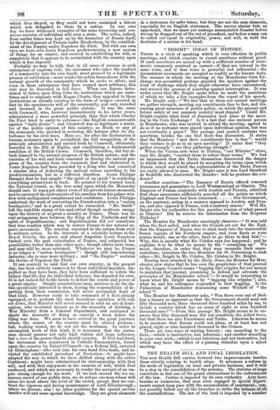"BRIGHT" IDEAS OF HISTORY.
MERE i8 a style of speaking which is very effective in public
meetings, and which consists in round assertions without proof. If such assertions are mixed up with a sufficient number of state- ments commonly received as correct—if they are uttered in the same voice, and if that voice is powerful and influential—the inconsistent averments are accepted as readily as the known facts. The manner in which the meeting at the Manchester Corn Ex- change was assembled perhaps guarded the speakers against the kind of challenge which they might otherwise have encountered, and secured the process of asserting against interruption. It was under cover that Mr. Bright spoke when he made the assertions of which we take a few examples from the report of his speech. Mr. Bright said—" We feel that at these our annual meetings we gather strength, meeting our constituents face to face, and dis- cussing great measures of public policy, on which the present and future safety of our common country must depend." Could Mr. Bright explain what kind of discussion took place at the meet- ing in the Corn Exchange ? Is it a fact that one eminent person in Manchester, who was invited to attend the meeting, agreed to do so if no restraint were placed upon individual opinion, but was not eventually a guest ? The passage just quoted contains two assertions besides the one that there was discussion. It states that the Members "met their constituents face to face": would they venture to do so in an open meeting ? It states that "they gather strength " : are they gathering strength ? . When the Vienna note went to Turkey, "our Minister" alone, says Mr. Bright, "excited them to refuse those terms." We had an impression that the Turks themselves discovered the danger in which they would be placed by accepting the terms upon which Russia seized and which the representatives of the Three Powers too easily allowed to pass. Mr. Bright says it was Lord Stratford de Redcliffe who discovered the blunder : will he produce the evi- dence?
Another assertion—" The Emperor of Russia offered renewed assurances and guarantees to Lord Westmoreland at Olmiitz. The Emperor of Franco, conjointly with Austria and Prussia, admitted that these assurances sufficiently guarded all the points on which England and France had been concerned.'. . . . Our Government, on the contrary, acting in a manner opposed to Austria and Prus- sia, and also opposed to France, took a contrary course." Will Mr. Bright cite his authorities for this peculiar version of what passed at Olmiitz ? Did he receive his information from the Emperor Nicholas ?
'The Member for Manchester sneeringly observes—" It was said when the fleet sailed, and when the Guards set out for the East, that the Emperor of Russia was to slink back into the inaccessible frozen regions of his Northern empire and your fleets or your armies would, one or the other, have to ; go there to find him."— Why, this is exactly what Mr:Cobden says bas happened ; and he explains it to be what he meant by the "crumpling up." We must, therefore, in order that they may reconcile their repre- sentations, introduce the two Members for St. Petersburg to each other—Mr. Bright to Mr. Cobden, Mr. Cobden to Mr. Bright. Having been attacked by the Daily News, the Member for Man- chester now states that he has seen the proprietors of that journal in the League Council rooms "begging like cripples for our money to maintain that journal, promising to defend and advocate the principles of the Manchester schooL"—It would be interesting to know what Mr. Bright means by "begging like cripples "; also, what he and his colleagues responded to that begging, Is the Palmerston of Manchester denouncing some Wiekoff of "the school "?
The Member for Manchester asks, "Was there ever out of Bed-
lam a lunacy so apparent as that the Government should send out fifty thousand men, three thousand three hundred miles by sea to invade a country which has an army of eight or nine bundled': thousand men ? "—From this passage Mr. Bright seems to be un- aware that fifty thousand men did not constitute the Allied force, but thafihere are also Frenchmen and Turks. Likewise he seems to be unaware that Russia could not place or at least has not placed, eight or nine hundred thousand in the Crimea.
There are two ways of writing history : one according to the facts,—which is instructive, but laborious ; and another according to your own wish,—which is not laborious and not instructive, but which may have the effect of a passing stimulus upon a select meeting.


































 Previous page
Previous page